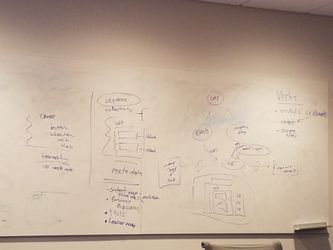<Please enter your notes here>
Julie Mullen Notes:
Day 1: Presentations - posted elsewhere
Day 2:
I arrived late - so I was trying to catch up with the discussion - see bullets below from morning session - images uploaded to other page.
Learning Path
Adaptive Applications
- Adaptive engine interacts with user
- UX elements
- Sequence
Verbs:
- On/off/elements ux elements
- Content
- Scope/filter
- State
Basic central design – content (Pearson adaptive)
Learning model availability used to adapt UX
Adaptive exp runtime query
Adaptive Engine
- Hinting – problem level
- Mastery – problem level
- Recommendation – consider authority level (what happens when we give user choices -
- Gamification – adaptive ux elements
- Need fallback path
- Should lms inform AE re: platform (mobile, desk) (yes, UI etc)
- Includes
- Content map (? Not same meaning)
- Forums/discussion
- Tools/schedule
- Learner mode
xAPI
- Event is dot – who did what when with what result
- But we need the sequence – student stopped video example – of dots
- Want to record events from pedagogic perspective
Afternoon Session:
Questions from the morning:
- Stakeholders
- Instructor – can override
- Course team – configures
- Student can modulate? (y/n)
- Required
- recommended
- Stakeholders
- Adaptive engine - suggests
- Platform – enforces
- Learner – creates own path for learning goal cross platform
- Course teams configure AE
- How to use AE result
- Level 1 – Define interfaces for AE at Adaptive UX component level
- Level 2– assessment level
- Level 3 – adapting sequence/structure
- Concept map (Adaptive Sequences)
- Visual representation
- Mathematical or CS operation of mapping
- Structure of course
- Review Adaptive Usages list
- Specific use case walkthrough (water through the pipes)
- Walking through Harvard Engine
- UI experience – needs
- Pluggable (Adaptive) UX components (cross course potential)
- Can use Adaptive Exp. Service
- In-course x blocks
- Can also use Adaptive Exp. Service
- Pluggable (Adaptive) UX components (cross course potential)
Defining UI responsibility
Propose: not expecting adaptive engine to create UI (i.e html) but can give feedback re: how to configure (mobile/desktop), what adaptive options/block to add
key: not part of Adaptive Engine
What’s next API
- Set of options
- Could be defined by LM and LMS would render
Update diagram:
Replace LMS with “front end” and “back end”
What is Adaptive Ex – extended xblock with more flexibility and functionality
Custom engine <=> custom xblock
Braden: xblock = leaf content, UI adds the adaptivity
Agree on “pluggable UX components”
Clear Use Case
- Adaptive hints
- Adaptive sequence
Research suggests that maps overwhelm students
Autogeneration of path through content/course/multiple courses for “degree/cert”
Andrew Ang – walkthrough of VPAL updates
Zach – Berkeley use case
- Initial training
- Gets event
- Uses items from event store
- Compares versions (remove vertical/ add vertical)
- Builds a set of recommendations
- Turn on engine week 2
- Student accesses page
- Every unit (vertical) has content that comms with AE for recommendation (work around)
- Comm student at page through events, xAPI
- Engine not reply to Adaptive Exp until get retuls (to avoid race condidtion)
- Update history
- Add to model
- Model gives as output à comms with Adapt. Exp
- Adapt Exp talks to block store to get name of unit/vertical and that gets inserted in UI code
- UI code div ==visible to display to learner
- When user goes to new vertical – update time spent in old vertical
- Question – how would this look if Zach had xUnit/adaptive unit
Immediate Deep Dives that need to be done later
- Content tagging
- Grading (tabled for future discussion)
- Reuse some blocks for some users
- API specification
- Adaptive experience service API
- Egnine’s – what’s next
Summary:
Projects:
- Blockstore (edX + Opencraft + Harvard
- Summer time release
- Built into master branch
- Tagable at every level
- Constructs for tagging
- Dissociates content from navigation
- Harvard Adaptive courses (ALOSI evolution)
- Adaptive assessments
- Adaptive units
- Fall time frame
- CET
- Have Campus.il (Open edX)
- Adaptive course using CET
- Need to integrate xAPI into edX insights
- Demo May, phase 2 – integrate to edX
- Berkeley
- 4 courses in May (2 Microsoft, 2 Delft)
- running with current edX workaround
- need Open edX partner
- Content Library (MIT Campus)
- What is the state
- Need tagging service (what does Branden see this as?)
- Taxonomy 1st class service
- How do you define tazonomy
- Way to associate content with taxonomy
- Query taxonomy
- Auto generated
- Used across serves
- Tags for
- Units,
- Sections
- Components
- Courses
General Needs
- LMS + API from 3rd party
- xAPI translator for LMS clickstream
- LMS provides who à event store
- 3rd party provides did, what à event store
- event store
- for analysis
- plugable adaptive UI elements
- for adaptive sequences
- broader implications requires working with edX team
- block store + other new primitives
- metadata
Logistics:
- summary of workshop
- will make wiki available
- project definition open for contribution
- time line
- description
- interested parties
- Left for discovery
- Metadata/content tagging
- grading
